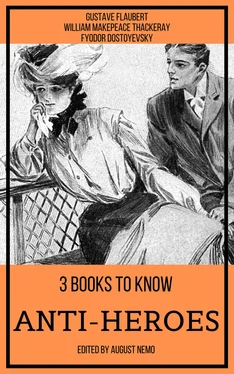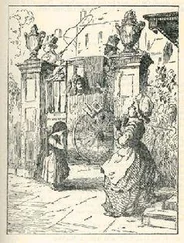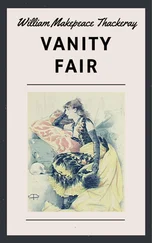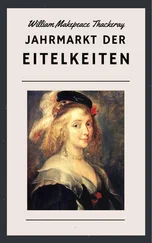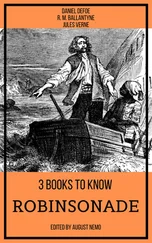‘I do not see that that affects the truth of the proposition,’ said the old lady drily, and continued her narrative. ‘The Jew who held the emerald had had many dealings with the Princess, and at last was offered a bribe of such magnitude, that he determined to give up the pledge. He committed the inconceivable imprudence of bringing the emerald with him to X——, and waited on Magny, who was provided by the Princess with money to redeem the pledge, and was actually ready to pay it.’
‘Their interview took place in Magny’s own apartments, when his valet overheard every word of their conversation. The young man, who was always utterly careless of money when it was in his possession, was so easy in offering it, that Lowe rose in his demands, and had the conscience to ask double the sum for which he had previously stipulated.
‘At this the Chevalier lost all patience, fell on the wretch and was for killing him; when the opportune valet rushed in and saved him. The man had heard every word of the conversation between the disputants, and the Jew ran flying with terror into his arms; and Magny, a quick and passionate, but not a violent man, bade the servant lead the villain downstairs, and thought no more of him.
‘Perhaps he was not sorry to be rid of him, and to have in his possession a large sum of money, four thousand ducats, with which he could tempt fortune once more; as you know he did at your table that night.’
‘Your ladyship went halves, madam,’ said I; ‘and you know how little I was the better for my winnings.’
‘The man conducted the trembling Israelite out of the palace, and no sooner had seen him lodged at the house of one of his brethren, where he was accustomed to put up, than he went away to the office of his Excellency the Minister of Police, and narrated every word of the conversation which had taken place between the Jew and his master.
‘Geldern expressed the greatest satisfaction at his spy’s prudence and fidelity. He gave him a purse of twenty ducats, and promised to provide for him handsomely: as great men do sometimes promise to reward their instruments; but you, Monsieur de Balibari, know how seldom those promises are kept. “Now, go and find out,” said Monsieur de Geldern, “at what time the Israelite proposes to return home again, or whether he will repent and take the money.” The man went on this errand. Meanwhile, to make matters sure, Geldern arranged a play-party at my house, inviting you thither with your bank, as you may remember; and finding means, at the same time, to let Maxime de Magny know that there was to be faro at Madame de Liliengarten’s. It was an invitation the poor fellow never neglected.’
I remembered the facts, and listened on, amazed at the artifice of the infernal Minister of Police.
‘The spy came back from his message to Lowe, and stated that he had made inquiries among the servants of the house where the Heidelberg banker lodged, and that it was the latter’s intention to leave X——that afternoon. He travelled by himself, riding an old horse, exceedingly humbly attired, after the manner of his people.
‘“Johann,” said the Minister, clapping the pleased spy upon the shoulder, “I am more and more pleased with you. I have been thinking, since you left me, of your intelligence, and the faithful manner in which you have served me; and shall soon find an occasion to place you according to your merits. Which way does this Israelitish scoundrel take?”
‘“He goes to R——to-night.”
‘“And must pass by the Kaiserwald. Are you a man of courage, Johann Kerner?”
‘“Will your Excellency try me?” said the man, his eyes glittering: “I served through the Seven Years’ War, and was never known to fail there.”
‘“Now, listen. The emerald must be taken from that Jew: in the very keeping it the scoundrel has committed high treason. To the man who brings me that emerald I swear I will give five hundred louis. You understand why it is necessary that it should be restored to her Highness. I need say no more.”
‘“You shall have it to-night, sir,” said the man. “Of course your Excellency will hold me harmless in case of accident.”
‘“Psha!” answered the Minister; “I will pay you half the money beforehand; such is my confidence in you. Accident’s impossible if you take your measures properly. There are four leagues of wood; the Jew rides slowly. It will be night before he can reach, let us say, the old Powder-Mill in the wood. What’s to prevent you from putting a rope across the road, and dealing with him there? Be back with me this evening at supper. If you meet any of the patrol, say ‘foxes are loose,’—that’s the word for to-night. They will let you pass them without questions.”
‘The man went off quite charmed with his commission; and when Magny was losing his money at our faro-table, his servant waylaid the Jew at the spot named the Powder-Mill, in the Kaiserwald. The Jew’s horse stumbled over a rope which had been placed across the road; and, as the rider fell groaning to the ground, Johann Kerner rushed out on him, masked, and pistol in hand, and demanded his money. He had no wish to kill the Jew, I believe, unless his resistance should render extreme measures necessary.
‘Nor did he commit any such murder; for, as the yelling Jew roared for mercy, and his assailant menaced him with a pistol, a squad of patrol came up, and laid hold of the robber and the wounded man.
‘Kerner swore an oath. “You have come too soon,” said he to the sergeant of the police. “FOXES ARE LOOSE.” “Some are caught,” said the sergeant, quite unconcerned; and bound the fellow’s hands with the rope which he had stretched across the road to entrap the Jew. He was placed behind a policeman on a horse; Lowe was similarly accommodated, and the party thus came back into the town as the night fell. ‘They were taken forthwith to the police quarter; and, as the chief happened to be there, they were examined by his Excellency in person. Both were rigorously searched; the Jew’s papers and cases taken from him: the jewel was found in a private pocket. As for the spy, the Minister, looking at him angrily, said, “Why, this is the servant of the Chevalier de Magny, one of her Highness’s equerries!” and without hearing a word in exculpation from the poor frightened wretch, ordered him into close confinement.
‘Calling for his horse, he then rode to the Prince’s apartments at the palace, and asked for an instant audience. When admitted, he produced the emerald. “This jewel,” said he, “has been found on the person of a Heidelberg Jew, who has been here repeatedly of late, and has had many dealings with her Highness’s equerry, the Chevalier de Magny. This afternoon the Chevalier’s servant came from his master’s lodgings, accompanied by the Hebrew; was heard to make inquiries as to the route the man intended to take on his way homewards; followed him, or preceded him rather, and was found in the act of rifling his victim by my police in the Kaiserwald. The man will confess nothing; but, on being searched, a large sum in gold was found on his person; and though it is with the utmost pain that I can bring myself to entertain such an opinion, and to implicate a gentleman of the character and name of Monsieur de Magny, I do submit that our duty is to have the Chevalier examined relative to the affair. As Monsieur de Magny is in her Highness’s private service, and in her confidence I have heard, I would not venture to apprehend him without your Highness’s permission.”
‘The Prince’s Master of the Horse, a friend of the old Baron de Magny, who was present at the interview, no sooner heard the strange intelligence than he hastened away to the old general with the dreadful news of his grandson’s supposed crime. Perhaps his Highness himself was not unwilling that his old friend and tutor in arms should have the chance of saving his family from disgrace; at all events, Monsieur de Hengst, the Master of the Horse, was permitted to go off to the Baron undisturbed, and break to him the intelligence of the accusation pending over the unfortunate Chevalier.
Читать дальше
